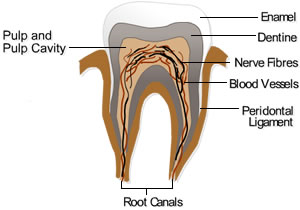Our teeth are composed of layers. The outer white/cream visible layer is made up of a calcium based mineral (hydroxyapatite) called enamel. Enamel is the hardest substance in the human body and provides the incredible strength necessary for many decades of efficient chewing.
Under the enamel is a softer layer of dentine which is a living tissue containing nerve endings. Dentine can be both sensitive to heat and cold and is more easily abraded than enamel if it becomes exposed.
In the centre of the tooth is the pulp cavity containing nerves and blood vessels necessary for the health of the tooth.

The major oral health problems encountered by humans are generally caused by two factors: what we eat and drink and the bacteria that occur naturally within the mouth. Oral care products aid good oral hygiene by removing food debris and plaque (which contains bacteria) and strengthening the teeth against attack. Many also work to freshen breath and create the clean feeling experienced after use.
Plaque and Tartar
Plaque is a soft, pale yellow, sticky substance that builds up on the surfaces of our teeth if we don't brush them regularly. It can cause tooth decay and gum disease. Plaque is formed by bacteria when they are allowed to multiply on the surface of the teeth.
Calculus (commonly known as tartar) is plaque that has been left on teeth for a long time and gone hard. It builds up on teeth and this can make the teeth feel rough and look unsightly. It tends to form where the teeth meet the gums and in between teeth. Calculus is too hard to be able to remove it yourself with a toothbrush and so it needs to be removed properly by a dentist or hygienist using special cleaning tools. You can help prevent calculus forming by keeping your teeth clean.
Gingivitis and Gum Disease
Infection affecting the surface tissues of gums is called gingivitis. This may progress to affect the deeper supporting tissues and become periodontal disease. Both conditions may be the result of plaque and tartar build-up on the surface of the teeth. The effects of gingivitis are largely reversible with appropriate care. Once this has progressed to periodontitis there is permanent damage to the ligament and bone that supports and holds the teeth. Often a space develops between the gum and the tooth. This space forms a protected environment for more bacteria, and the condition progresses. If left untreated periodontitis may eventually cause abscesses and tooth loss.
Tooth Decay
Tooth decay can also occur if plaque is left on the teeth. It is caused by bacteria which live in plaque. The bacteria make acids which soften the tooth's surface. These acids dissolve away the minerals in the tooth's outer surface, the enamel, and this process is known as demineralisation.
In order to grow and multiply, bacteria feed on the sugars in the food and drink that we consume. Once all the sugar has been used, the acid in plaque gradually disappears and the tooth has a chance to repair itself (called remineralisation). The minerals in saliva help this to happen, and so does the fluoride in toothpaste and mouthwash.
If plaque is not removed regularly, or if sugar is eaten too often, plaque bacteria can keep producing acid and the tooth doesn't get a chance to repair itself properly. Eventually a small hole (or cavity) appears.
Bad Breath
There are many causes of bad breath. It may simply be that we have been eating highly flavoured or spiced foods or drunk too much alcohol. Once digested, food is transferred to the bloodstream which supplies the lungs. Odour compounds from the food can pass from the blood into the lungs and are breathed out. Brushing, flossing and using mouthwash will only mask these odours temporarily; the bad breath will continue until all of the odour compounds have been eliminated from the body.
Too many alcoholic drinks also cause dehydration and a dry mouth. Or it may be that a person breathes through their mouth rather than their nose also making the mouth dry. Saliva contains antibacterial enzymes which help control the growth of bacteria. It also washes away bacteria. If the flow of saliva is reduced, bacteria can grow and multiply leading to bad breath.
Smoking is often cited as a cause of bad breath.
If we don't brush our teeth, food can stay in our mouth between our teeth. This creates a welcoming environment for bacteria to grow. As bacteria break down the trapped food particles, unpleasant odours can be released which also result in bad breath.
Besides changing our diet to consume fewer 'smelly' foods, a good oral care routine will also help to reduce the causes of bad breath. However, persistent bad breath may be a sign of an underlying illness. According to the American Dental Association, local infections in the respiratory tract, chronic sinusitis, postnasal drip, chronic bronchitis, diabetes, gastrointestinal disturbance and liver or kidney ailments can cause breath to smell. The first step in identifying the cause is to consult a dentist to see if the mouth is healthy.
Sensitive Teeth
Some people may suffer the pain of sensitive teeth. For example, do your teeth hurt when drinking tea or coffee or eating ice-cream? People who suffer mild or severe pain when eating or drinking hot or cold food may have sensitive teeth. Others are affected by sweet foods or acidic drinks such as fruit juice or fizzy pops. Women are more likely to have the problem of sensitive teeth than men although the reasons why are unknown.
The discomfort of sensitive teeth can often be reduced or eliminated by using a specially formulated toothpaste. However, where there is a more serious underlying cause, dental treatment will be necessary.
The enamel outer layer of our teeth protects the softer dentine underneath which connects to nerve endings. If the enamel is worn away or damaged, it gives less protection to the living dentine, particularly close to the gum line. The dentine is more quickly affected by heat and cold, stimulating the nerve endings and resulting in varying degrees of pain.
Possible causes are:
-
receding gums - caused by irritation from plaque and tartar, excessive brushing and natural ageing;
-
damaged or weakened enamel - caused by excessive brushing, acid attacks and grinding our teeth;
-
damaged teeth or fillings;
-
procedures such as tooth bleaching.
As well as twice daily brushing with a fluoride toothpaste to ensure healthy teeth and gums, special toothpastes can help reduce or eliminate the associated pain and address some of the causes. They work in one of two ways:
-
calming the nerves themselves; or
-
blocking the pathway in the dentine which leads to the nerve endings.
Dentists also have treatments that may be suitable, such as fluoride gels to strengthen the enamel or sealers to cover up exposed roots where gums have receded. In the worst case, root canal fillings by a dentist can kill the living parts of a tooth.

